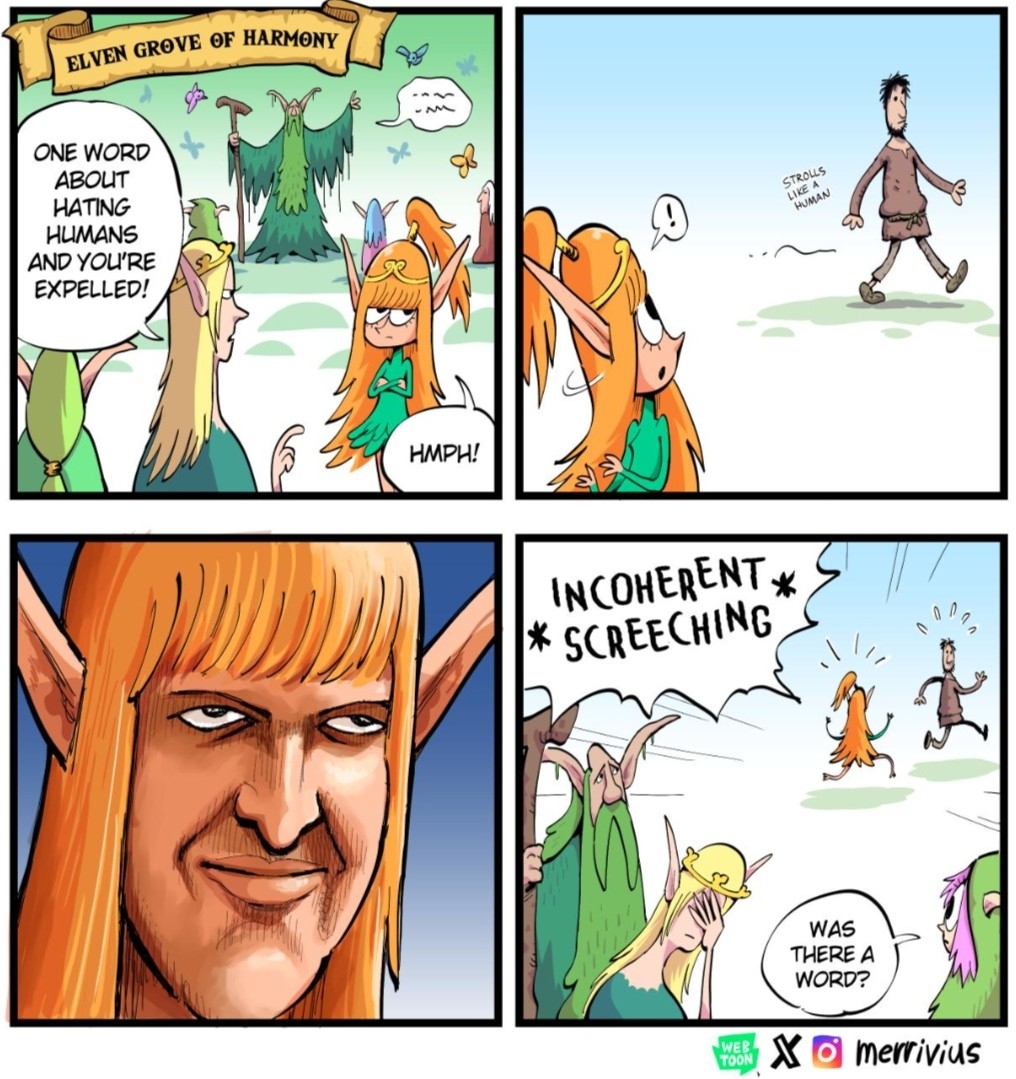I used to follow her on Twitter. She'd be constantly berated by some guy in France. Like, dude, if you're arguing with a buster because she combed through your shit and found louse, you've lost twice this game.
Science Memes
Welcome to c/science_memes @ Mander.xyz!
A place for majestic STEMLORD peacocking, as well as memes about the realities of working in a lab.

Rules
- Don't throw mud. Behave like an intellectual and remember the human.
- Keep it rooted (on topic).
- No spam.
- Infographics welcome, get schooled.
This is a science community. We use the Dawkins definition of meme.
Research Committee
Other Mander Communities
Science and Research
Biology and Life Sciences
- [email protected]
- [email protected]
- [email protected]
- [email protected]
- [email protected]
- [email protected]
- [email protected]
- [email protected]
- [email protected]
- [email protected]
- [email protected]
- [email protected]
- [email protected]
- [email protected]
- [email protected]
- [email protected]
- [email protected]
- [email protected]
- [email protected]
- [email protected]
- [email protected]
- [email protected]
- [email protected]
- [email protected]
- !reptiles and [email protected]
Physical Sciences
- [email protected]
- [email protected]
- [email protected]
- [email protected]
- [email protected]
- [email protected]
- [email protected]
- [email protected]
- [email protected]
Humanities and Social Sciences
Practical and Applied Sciences
- !exercise-and [email protected]
- [email protected]
- !self [email protected]
- [email protected]
- [email protected]
- [email protected]
Memes
Miscellaneous
Not any guy, our very own Didier Raoult. Unethical, gross, money hoarding, conspirationist and overall public danger Didier Raoult.
If Scientists don't publish they do not get grants. Grants it turns out pay their rent, and things like food, and transportation, and kids summer camp. Failure also has a detrimental effect in the attaining of grant monies. There's a direct line here. For those that choose to go down this road, they do it for as long as they can get away with it, then try to plea bargain.
Academia needs to be restructured, just like everything else
Hey, that sounds like Communism!1!
Count me in!
Its not just the volume of publishing, but the conclusion of the paper if you publish a paper and the result is boring (the X had negligible impact on Y but its inconclusive) you might still put your grant at risk.
This is also the reason why failed experiments hardly ever get published: "We tried X to achieve Y but it did not work because of Z" is very useful information for people also thinking about trying X, but good luck publishing that paper.
Yeah, I'm really not surprised this a more widespread thing. Hell, Wakefield got followers to this day buying his dumb books. Fraud pays
My father in law (prior to his passing) worked for the National Science Foundation and his job was to investigate grant fraud like this. Apparently it happens all the time.
Fuck capitalism!
We need housing and food for everyone, then we can all chill out and focus on advancing further.
This hamster wheel of shit is going to kill us all.
but think of the bajilionaires! how will they afford their yachts without stealing value from people!?
With their bootstraps! And hustle! And so much work that they do 10 days a week!
Because some people just treat it like a silicon valley start-up: say you've got results from your smoke and mirror show and then hope someone actually gets the results.
These are fantastic documentaries BTW, highly recommend if you liked Mayday, NOVA, Life, or any long form investigative journalism.
Good ol" BobbyB does not miss, thank the gods. Memes aside, his work is indeed phenomenal.
I mean thats pretty out-right fraud, but plenty of scientific fraud is more.. idk if I would say nefarious, but certainly as damaging. There is so much pressure to get "certain" results. Its much much more work to detect either intentional or "self-delusioned" statistical fraud. Science is already incredibly difficult when you don't have the pressure on you to generate specific results.
In Paleoanthropology these days, you will not find an article about a hominid fossil discovery that doesn't include some variant of the phrase "forcing Anthropologists to rethink their assumptions". This all derives from the "Lucy" find that truly did force Anthropologists to rethink their assumptions. Before Lucy, it was assumed that the two most unique aspects of humans - our big brains and our bipedal locomotion - evolved together, but the fact that the 3.9 myo Lucy (since revised to 3.3 myo) was fully bipedal despite having a chimpanzee-sized brain threw this assumption out the window. The career successes of her discoverers and analysts prompted everyone else who finds a bit of thigh bone to make similar claims of significance, despite the fact that no other discovery has had any real earth-shattering significance like that.
No fraud but just massive overstating of importance.
"tRuSt tHe sCieNCe!"
This is a joke of course...well kinda. When science is done well it can change the world. Who would be against that?
I don't like the phrase because while the process of science seeks to be as factual and unbiased as possible those in the scientific community are still human. They are fallible, corruptible and can do things for their own personal gain or profit. So to me it could mistakenly misunderstood as "trust science blindly"
But "Trust the science that is validated by multiple reputable sources" just doesn't roll off the tongue as nicely
Trust the process maybe? This post is about the process of science correcting errors after all.
I agree, that phrase seems to be a little misleading with the "trust in God" crowd because to them, that is the ultimate answer, and no other answer would come close to being "right". But "trust the science" is not meant to be the ultimate answer, just a sign pointing you in the right direction, so that you can then check the science to see if it's reliable. So, the science that you're trusting is not theirs, but yours.
"We did our research!" (flat earthing intensifies)
I'm kidding I see your point
you can then check the science
Me and what degree? Science is so far beyond what I can understand that I would need to spend years of my life studying a single topic to understand a small sliver of science.
I, and generalizing to we, need to take science on faith as much as anyone in a church. Actually, it's more on faith than in a church because anyone can pray and see what that results in.
Anyone have the Patron?
It really is incredible that we have a way now to fund the jobs that can only be created and performed by a select few individuals. We don't need a corporation to create the job for us, someone with a specific skill shows up and society says "yeah we need one of those."
really? never?
$19m in grants
i can't imagine they are just left with the money after
If you're already committing fraud, what's a little embezzlement sprinkled on top?
Academic grants can work in a lot of ways. It is common for a significant chunk to be taken as overhead by the university (20-40%). This is generally smaller for senior members of the faculty who bring in more grants. The PI (primary investigator, read: dude with a reputation) tends to get 5-10% to run the program, and then another 30-40% goes to salaries for researchers working under them (read: grad students). The rest, on the order of 20%, goes to capital costs like materials, time on expensive machines, or prototypes.
So this guy probably got paid $1-2M directly for the grants over maybe 3-5 years. Note I haven't looked into his specific situation.
That photo of Richard Eckert looks like the Leo reaction image; like he's thinking 'Oh my God I can't believe they're still buying this shit!'
I thought that so much I took a screen to post to comments. I'm glad I found your comment here. His expression is part smug, part guilt, part wainker.

I'll never forgive him for what happened at Black Mesa.
I'd say there are three pieces, each feeding into the next.
- A Culture Favouring Novelty Over Replication - There are no Nobel prizes for replicating findings. There is no Fields medal for roundly and soundly refuting the findings of a paper. There is no reputation to be built in dedicating oneself to replication efforts. All incentives push towards novel, novel, novel.
- Funding Follows Culture - Nobody wants to pay twice for a result (much less thrice) especially if there's a chance that you'll expose the result as Actually Wrong on the second or third go.
- Publish or Perish - Scientists have material needs -- both personally and for their actual work -- acquired through funding. That funding demands the publishing of novelty. If your results aren't novel, then they won't get published (not anywhere that matters, anyway). And if you don't get published (where it matters), then you don't get funded. And if you don't get funded, you perish. And so the circle of scientific life is complete.
At every step, the incentives involved in the production of science are, ironically, rewarding un-scientific behaviour and ignoring -- if not outright punishing -- actual science. Until replication is seen as an equal to novelty, this regime will persist.
The thing that gets me is that these people are all really smart. If someone is willing to lie and do math, why not work at an unscrupulous pharma/finance company? They'd make way more money and do way less work. I'd even argue that fraud in the private sector is less unethical - if investors give money to a fraud they deserve to lose it, and regulators take an adversarial stance and have whole orgs (in theory) policing fraud like the SEC and FDA.
It takes a really particular kind of scumbag to seek a position of public trust, make a bunch of trainees financially and professionally dependent on them, accept taxpayer money intended to help cancer patients, then commit fraud.
Very few people start with big transgressions. Usually stuff escalates.
It's why need systems that don't put humans in situations where bad behaviour is incentivised. Also why we need to be forgiving when someone comes forward with a small transgression, so people don't get stuck in escalating cycles.
I'm sure this guy did some solid research once upon a time.
I don't know about this specific case, but it's common for the big name researchers not to do any actual research or play any direct part in generating their images. That's often done by kids - 25 year old grad students, even 20 year old undergrads - or other trainees. Those people may not appreciate how easy it is to detect image manipulation and are still learning what kinds of 'refining' of imagery and datasets is acceptable, while the PI that pays their stipend or sponsors their visa rages at their inability to get an expected outcome or replicate a previous result.
Not saying there aren't people out there just flat-out frauding, but these are group projects with a structure of trust and pressure that can muddy assignment of culpability. Like any committee or corporate action, it can be tough to say that any one individual is the guilty party or which people where just going along with the group.
Oftentimes payed by insurance companies or have other financial intrests
Pretty simple reason. Money.
It's not just science, although science plays a role in every field. It's everywhere, and why we've reached market saturation with mediocrity, in every field, every business. Those who would exceed mediocrity are ostracized and othered as if excellence is a bad thing, unless they are willing to compromise in other, not public-facing areas.


